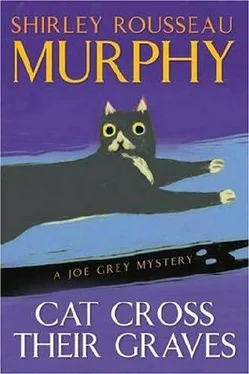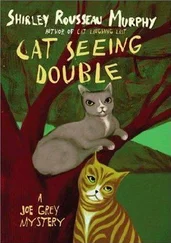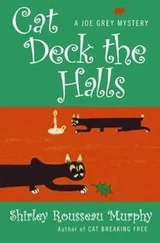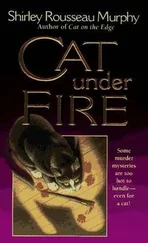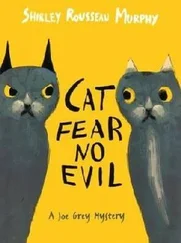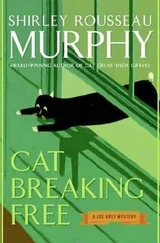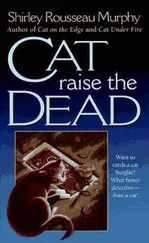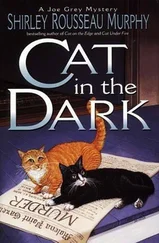Maybe she should go away now. Go back to the library before it got light, hide in her cave again. She didn't know what to say to Genelle Yardley, she didn't know how to explain why she'd come.
Except, that old woman had worked for Pa for a long time before he got mean and silent. She would know things about Pa that she, Lori, didn't know, that she needed to know. If she wasn't too sick, maybe Genelle Yardley could help her understand why Pa had turned so mean. She wished her stomach would quit growling. She hoped Ms. Yardley wasn't so sick that she was cross and wouldn't talk, like Pa.
Drawing close enough to the glass to just peek in, she saw that the room was empty. The bedclothes thrown back, a wheelchair standing in the corner. She could smell bacon, and syrup warming. That made her stomach really rumble. Was Ms. Yardley in the kitchen eating breakfast? She stood looking in, wondering if she should knock.
"Good morning," a voice said behind her. She spun around.
Down at the end of the terrace, in the shadows, there was a bench, and someone sitting there.
"Good morning," the woman said again. "Have you come for breakfast, child?"
"I… I'm looking for Ms. Genelle Yardley."
"I'm Genelle. Come sit down. Cora Lee's cooking pancakes. She'll make more than I can ever eat, she always does."
The thought of pancakes was like a warm light in a dark cold room. Lori approached the woman. Drawing near, she saw the shiny metal tubing of a walker standing beside the bench where she sat, and a cart with an oxygen tank on it, like when Mama was sick. Was this Cora Lee a visiting nurse come to cook Ms. Yardley's breakfast? Mama had had a visiting nurse, arranged for by the welfare people, but that nurse didn't make breakfast, she'd been sour and unpleasant; Lori hadn't liked her any better than that first welfare woman.
"Come, child. Come sit down."
Lori went to sit beside the old lady. She was tall, you could tell that even when she was sitting, tall and very thin. She had dark hair with gray in it, cropped close to her head. Her eyes were so dark they looked black. Her face was lined and sagging and her eyes were red, as if she'd been crying. She was dressed in a pink satin robe and pink slippers. She had a wadded-up tissue in her hand.
Lori remembered her now, from the shop office. But she'd looked stronger then, not so frail. The old woman's mention of pancakes and the smell of bacon cooking made her lick her lips. Ms. Yardley must have been weeping for a long time because there was a really big wad of tissues in the wastebasket beside the bench. Lori sat sideways on the bench, not quite facing her; she didn't like to look at someone who was crying.
"I like to eat early," Ms. Yardley said, tossing the tissue in the wastebasket. "I like to see the dawn come." She looked hard at Lori. "Even this morning, I love the dawn. Especially this morning. You can call me Genelle."
Lori looked at her with interest.
"You must like the morning, too, child, or you wouldn't be out so early. Are you all right? Is something the matter?"
Lori nodded that she was all right, then shook her head. No, nothing was the matter. She thought it funny that Ms. Yardley didn't ask why a child was out alone, so early, almost still the middle of the night.
"What is your name?"
"My… my name…" Lori could see, behind the old lady, a little table set for two, with a white cloth and wicker garden chairs. She listened to the comforting kitchen sounds from inside the house, the clink of plates and the scraping of a spoon on a pan.
The old woman squinted, leaning closer. "Could you be Lori? Lori Reed? Jack Reed's child?"
Lori was so surprised she wanted to leap up and run away. "I… I'm Lori." How did she know? Did Ms. Yardley remember her? She'd only been six, a baby. Now Genelle would start asking questions.
But she didn't, she only smiled, and blew her nose, which was already red from blowing. "I'm sorry about the tears. A dear friend has died. But surely that isn't why you have come?"
"Oh," Lori said, embarrassed. "No, it isn't. I'm sorry."
"I'm not weeping for her, she was in her eighties. Though it was an ugly, terrible death. I'm weeping for me because I'll miss her."
Lori didn't know what to say. She didn't really know how to think about people dying. It was hard enough to think about Mama. She didn't know what to think about dying. Grown-up talk about death made an emptiness come in her. "It's a nice garden," she said. "It's like The Secret Garden." Probably this old woman had never heard of The Secret Garden.
But Genelle's face lit right up. Her wrinkles deepened into a smile and her eyes brightened. "That's exactly what it's like! That's what I meant it to be when I planned this garden, when I had the wall built. A secret garden. You're a reader, child."
"I love The Secret Garden, I almost know it by heart. And have you read the Narnia books?"
"Oh, many times. I still read them every few years. I almost know them by heart! Sometimes Asian comforts me as no formal religion could ever do." The old woman laughed. "I decided long ago that when I die, that's the first place I'll go. To sail with Reepicheep into Asian's country and on, 'beyond the end of the world.'"
"Through the water lilies," Lori whispered, enchanted. "In a little coracle among the water lilies."
"Exactly. 'Where the waves grow sweet, there is the utter east.'" Reaching, Genelle took Lori's hand. "Why are you out so early? I'll tell Cora Lee to set another place." She seemed not to expect an answer. Or maybe she'd forgotten her question. Lori remained quiet.
"There's a little cat farther up in the garden," Genelle said. "Do you see her? How intently she's watching us. Up by the wall, among those white flowers." Genelle pointed up among the round boulders.
Lori looked up the garden. In the first faint gleam of dawn, she could see a cat crouched among the shadowed rocks, a dark silhouette that at first had seemed only another shadow. It was definitely a cat, looking down at them. It made her think of the library cat. But Dulcie wouldn't be way up here. There were cats all over the village, lots of cats.
"I used to have cats," Genelle said, "I'd always had cats until my Melody died. When Melody went, I grieved so. I never let another cat into my life, not ever." She reached for another tissue, but she wasn't crying now. "I remember that you used to go to the library with your mother when you were little; you learned to read long before kindergarten. I used to tell stories to the children on Saturdays; do you remember? You used to come to listen, you were always there for Saturday-morning stories, curled up in a corner of the window seat."
Lori remembered those story hours, sitting snug with the other children all among the cushions. How could she have forgotten that Genelle Yardley was the storyteller? Ms. Yardley mustn't tell Pa that she was here.
But better she tell Pa than that horrible little man with his rope and scary questions. The memory of his hands snatching her and hurting her, the feel of the rope tight around her; being unable to move or get out of that place filled her again. Afraid she would die there; a drowning, falling emptiness, with no one to cling to.
Genelle squeezed Lori's hand. "I'm sorry about your mama; I read it in the paper. I supposed you'd come back after she died, come to live with Jack."
Shaken, Lori nodded.
"It's hard to talk about death. My friend Patty wasn't young, and she'd made a good life. But your mama was so young. She went before her time, and that was very hard for you." Genelle touched Lori's chin, lifting her face so their eyes met. "Death is not the end, child."
Lori just looked at her. She didn't know what to say. She squeezed Genelle's hand. "The stories you used to read to us in the library, they were good stories. I liked Bran and the Celtic kings."
Читать дальше
